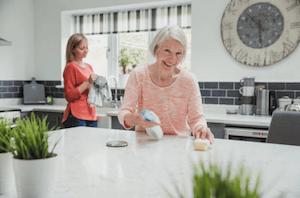Written by Jeff Smith
It’s a time-honored tradition, every spring the closets get emptied, the trash bags and storage boxes come out, and the house gets turned upside down - spring cleaning. It’s a great way to welcome the warmer months with a fresh start and a clean house.
Spring cleaning is especially important as you age. Removing clutter and preventing your home from becoming overly crowded has an important impact on seniors' mental health. The positive mental effects of being in control of your surroundings should never be discounted.
Here are some things to keep in mind as you begin spring cleaning either for yourself or with an aging loved one:
1. Remove trip hazards
Many aging adults have spent their entire lives collecting various odds and ends, and they were often taught growing up to never throw out anything that might be useful. This mentality results in homes that can be stuffed to the brim and cluttered with potential trip hazards, especially for seniors that have a hard time getting around. A stray lamp wire, an extra lazy chair, or multiple rugs on the floor can easily cause a fall, which is one of the most dangerous risks to seniors. Any potential obstacles that aren’t easily navigated should be removed to make the home less dangerous to move around in.
2. Clean out the medicine cabinet
Another important task is cleaning out medicine cabinets and pill boxes. Also check anywhere else in the house that prescription medications could be kept. Medication that is no longer actively prescribed or that is expired should be disposed of immediately. It is hard enough for most seniors to sort through their daily medication without having to thumb through extra pill bottles and check expiration dates.
3. Go through the kitchen
Next step is to go through the refrigerator and kitchen cupboards. Throw out any expired foods or drinks to prevent potential issues with mold and bacteria. Organize the cupboard so that foods are easy for seniors to reach and to find. Also take this opportunity to make sure your loved one's kitchen is stocked with the proper nutritious foods.
4. Organize personal effects
Help your loved one go through their personal effects, keepsakes, mementos, and other important objects that they have kept over the years. As you sort through, enjoy reliving the memories together, and then create groups of the items, organizing the items into a group that your loved one would like to keep, and a group that they can give away to friends and family or sell. With the things they want to keep, go one step further and help them organize the items either to display safely in the home, or to store neatly in boxes that are labeled in a storage area.
5. Do the general cleaning routine
As you are going through the home, open and clean out as many cupboards and cabinets as possible, and remove as much general clutter as you can. On top of that, make sure that all of the smoke detectors have fresh batteries, store winter decorations and clothing, and go about all of the other standard deep cleaning activities.
Unfortunately, spring cleaning, like most physical activities, only gets harder as we age. That’s where a licensed care provider could come in handy. Professional care providers can help with various housekeeping and cleaning tasks including laundry, dusting, vacuuming, and most other simple requests. Plus, who better to assist you with disposing of old medication than a licensed professional? Professional care providers also understand how to best organize homes for maximum safety.
If you would like to explore additional assistance as an option for your loved one, American In-Home Care can help. We refer qualified and compassionate care providers that are matched directly with your loved one's personality and needs. Contact us today at 1-844-505-0004 to discuss your care needs.


